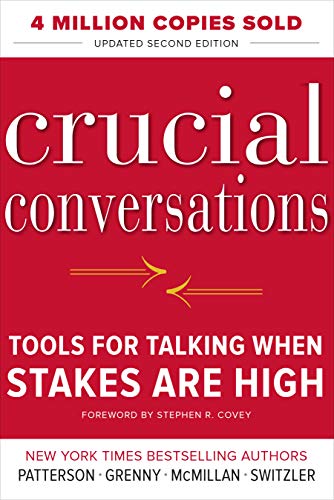Peace or Controversy?
We all want to live in peace and have positive interactions with everyone we meet or work with. But life is not like that – not all the time anyway – because people are not the same. People have contradictory opinions and that’s ok. But as a leader of your team, how do you manage controversy? Stela Toderascu shares her experience on this subject.
It’s common knowledge that we learn more from our failures rather than from our successes.
And when we talk about human relationships we learn more from controversy or when we are challenged.
The mistake most of us make in our crucial conversations is we believe that we have to choose between telling the truth and keeping a friend.
Kerry Patterson, ‘Crucial Conversations- Tools for Talking When Stakes Are High’
In my career I enjoyed harmonious relationships with my colleagues and even when two of them would engage in heated arguments, I would always try to ease the tension. Most times, the interlocutors would reach an agreement.
In other situations, when I was engaged in this type of discussion and an agreement was not reached, I would always be ready to give in. At that moment I was really proud of my peacemaking skill.
After an internal assessment, I received feedback that I needed to stand for my opinion and also allow others to engage in a back-and-forth conversation, as this was generating new ideas and challenges when a business strategy was being discussed, thus making it stronger in the end. And my colleagues were absolutely right. Even if it was harder for me to change, at least I started to acknowledge the benefit of crucial conversations.
When I stepped into a managerial role, being part of the management team, my expectation was that everyone would be friendly and we will have a really good collaboration.

It wasn’t like that at all :).
I was challenged quite often, there were many debates and arguments. I had to adapt, even if this meant I needed to change the way I was reacting to various discussions.
It was hard I must say. Luckily at that moment, I was part of a mentoring program and my mentor recommended me the book ‘Crucial Conversations’ by Patterson, Grenny, McMillan and Switzler.

I got some really great insights on how I should manage my crucial conversations with colleagues and how to choose the battles I’d like to win.
You can identify a crucial conversation by 3 indicators mentioned in the book:
- Stakes are high,
- Opinions vary,
- Emotions run strong.
It is your choice to avoid that particular conversation or choose to handle it well.
We are designed wrong. When conversations turn from routine to crucial, we’re often in trouble. That’s because emotions don’t exactly prepare us to converse effectively. Countless generations of genetic shaping drive humans to handle crucial conversations with flying fists and fleet feet, not intelligent persuasion and gentle attentiveness.
Crucial Conversations
The book has 11 chapters, and it is easy to read. It makes you confident to act, or at least it makes you want to change the way you handle conversations.
Most of us need to communicate with others in order to get things done at our place of work or to have a good relationship at home.
Some say we come to work to get things done and not to make friends, thus there is no need to invest in relationships.
At the same time, most people build their projects, jobs, careers, businesses, based on the relationships they develop.
I admit it’s easier to say: I’ll do it by myself somehow, I’ll figure it out, it’s too complicated to get close to people, what if there wouldn’t be any chemistry and I will just lose precious time?
As far as I’m concerned, I felt comfortable knowing that for any issue or question I might have, I knew the right person who had the answer, or at least he or she could direct me where to search for the right information.

I believe building relationships is one of the most important aspects of my professional life.
And no, I am not talking about networking. Building relationships takes time, sharing experiences together, going through failures and successes together.
Each of us has his/her own reality based on our experience and this is the most precious thing in business.
By not being the same we can generate different ideas, we can see different perspectives. That’s why diversity in a team is crucial.
As much as others may need to change, or we may want them to change, the only person we can continually inspire, prod, and shape—with any degree of success—is the person in the mirror.
Kerry Patterson, ‘Crucial Conversations – Tools for Talking When Stakes Are High’
You know you have built a relationship when you call each other for advice or just to ask How are you? even if you don’t work together anymore. A lot of these relationships are the result of a crucial conversation that happened some time ago.
To get the most of a discussion, answer the following questions:
What are the stakes? How important is it for me/the business to get involved in this discussion?
What are the facts I can use in the discussion?
If I were in my colleague’s place what would I do/say?
If I agreed/disagreed with his/her opinion what would happen?
What 3 positive outcomes could occur following this discussion?
In the end, it doesn’t matter if you are a peacemaker or an arguer, just come out of your comfort zone and try a new approach. See what happens :).
Join the Conversation
We’d love to hear what you have to say.
Get in touch with us on Facebook Group and Twitter.

